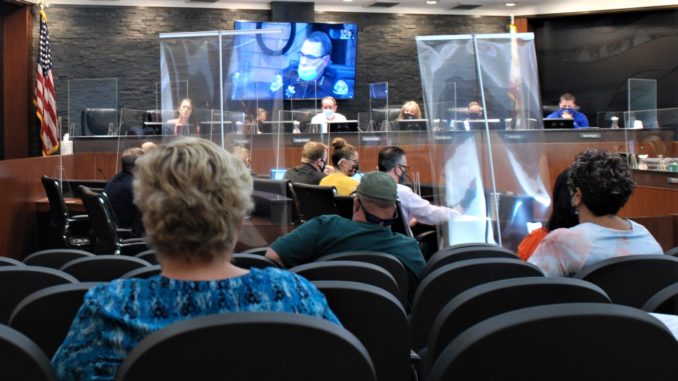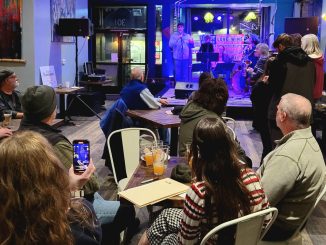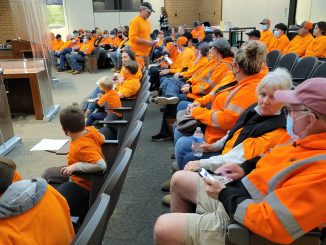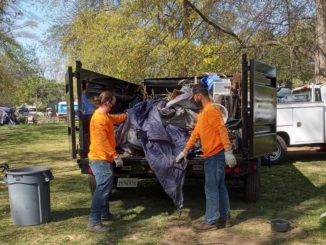
Litigation was the theme of the day Tuesday (June 8) in Chico City Council Chambers, with a legal challenge prompting cancellation of a public forum and an active lawsuit influencing deliberations in the council’s meeting.
City officials planned a 2 p.m. pension bonds workshop—ahead of the council’s 4 p.m. special session—to answer citizens’ questions about a proposed refinancing of the city’s unfunded liability with CalPERS. However, the Howard Jarvis Taxpayers Association told the city in a June 1 letter that such bonds require voter approval, not council approval. With a bond issuance requiring validation in Butte County Municipal Court, now in the face of opposition by a statewide advocacy group, the city canceled Tuesday’s forum.
Tuesday’s special meeting of the council proceeded with two-dozen attendees in person, delayed 10 minutes by closed session discussion of Warren v. Chico, the federal suit filed by Legal Services of Northern California on behalf of eight homeless Chicoans to stop the city’s encampment sweeps. The special session agenda called for the council to give direction on how to allocate the city’s $22.1 million in funding from the American Rescue Plan (ARP), the federal COVID-19 relief package. And Warren v. Chico—on which the council took no action in closed session—reemerged as a sticking point in ARP deliberations, as did homelessness in general.
Ultimately, the council needed five motions on ARP funding before finding a way forward, and even then, the resolution had undergone so many modifications that it prompted a council member to interject a clarifying question before supporting the proposal. The 5-2 vote united in dissent progressive Alex Brown and conservative Kami Denlay.
The council approved for the most part the framework from City Manager Mark Orme and Administrative Services Director Scott Dowell, which prioritizes technological upgrades, infrastructure projects and support of local businesses. Changes included reallocating funding from starting a job-placement program for homeless people to, instead, supporting youth programs; broadening a downtown building improvement fund to include business from any area of the city; removing “nexus to homeless” language from the description of funds for the new BMX track; and a request for the city attorney’s analysis of whether ARP money could be utilized for a homeless resting site.
Sean Morgan, a former mayor re-elected to the council in November along with three other conservatives, made the motion that got seconded by progressive Scott Huber, who’d earlier moved to accept the framework as proposed. (No other council member gave his motion a second, so it died without a vote.) Morgan did not endorse all the modifications—he said he didn’t oppose the homeless jobs program—but proposed what he felt was an acceptable compromise after almost 2-1/2 hours in open session.
“I didn’t want to be here at this time tomorrow,” he told the CN&R. “We’ve got seven council members, everyone wants to do something a little different, we can’t break the money up dollar by dollar. Staff asked, ‘How do you feel about the allocations?’—we were getting nowhere.
“I heard from my colleagues [that] there didn’t seem to be support for the back-to-work program; I didn’t think it was a terrible idea, but I also wasn’t married to it, so I was willing to take it out. On the youth program thing, I actually think that’s a good idea by Ms. Denlay, but I reverted back to one point where we were talking about giving money to the county, giving money to the school district; they get their own money, they’re certainly not giving us any, so that might be something the school district could do. But then I caught at the end that, well, if we take the money away from the back-to-work program, we have some allocation, why not [give] it to a youth program—something good and fun and family-friendly?
“I was trying to get the council to a ‘yes,’” Morgan added.
Questions and concerns
Most of the changes came in response to Denlay, a first-term council member who raised the most concerns, particularly on items connected to homelessness.
She called out wording in the $600,000 allocation for improvements at the new BMX track, criticizing a label that included “as well as nexus to homeless” though the council having recently voted not to consider the current BMX facility as a sheltering option. She questioned why staff had not allocated any of the funds to other options allowed under the ARP, such as premium pay for essential workers and programs such as behavioral health and education, provided by other local governmental entities.
She also drilled down on an ARP provision precluding use of funds for a legal settlement; if the city built a rest area for homeless citizens to answer Warren v. Chico, would that be a settlement? Since City Attorney Vince Ewing could not provide an immediate answer, citing the need to research specifics, the question remained an unanswered issue at least until the regular meeting next Tuesday (June 15).
Orme’s framework connected the rest area in question to park rehabilitation with a joint funding amount of $1.05 million. He explained to the council that city staff will not be able to assess the scope of park work required until campers relocate, nor does staff have an estimated cost for a resting site. Council discussions—and motions—to separate these elements or set fund proportions within the $1.05 million reached impasses.
The jobs proposal would have allocated $500,000 to what Deputy City Manager Jennifer Macarthy called a transitional employment pilot program. The city would have partnered with the Alliance for Workforce Development and other service providers to offer training and placement assistance for 30 homeless people, with the aim of securing six-month jobs for 15 who then could transition to permanent work. Several of the 17 public speakers echoed Mayor Andrew Coolidge’s questioning the cost-benefit ratio, though Macarthy explained that the program would cost less—she estimated half—after the initial pilot phase.
Items approved include $6 million toward a sewer expansion in southeast Chico; $5 million toward citywide broadband, a plan under development by Dowell in administrative services; $1.5 million to widen downtown sidewalks to allow for more outdoor dining and outdoor retail spaces; $1.2 million for a new police dispatch system; and $1 million in small business support. The building enhancement funding, expanded beyond downtown, is $200,000.
Morgan told the CN&R that while the ARP money will be impactful, it will not radically redefine the city.
“There’s some people that are concerned that, ‘Oh, the council’s going to vote to give all this money to a resting place, and this is the first step towards Chico being Los Angeles,’” he said. “I am prone to exaggeration myself to make a point, and I understand their point, and I’m a firm believer in accountability and enforcement—but it’s not up to me anymore. If somebody says you’ve got to accommodate this in order to keep all these other things clean, safe and beautiful, then that’s what I do—particularly when it’s a federal judge.”




I appreciate that I am late in my response to the ARP funding discussions and don’t know all the limitations. However, in volunteering with Passages and CHAT, I am aware that many formerly homeless now live in substandard housing with fear of eviction due to uncontrolled, bedbug, mice, and cockroach infestation as well as loud noise and malicious activities from neighbors. I realize these are code violations but even though reported, nothing has been done. I realize this should be handled via landlords and code enforcers, but perhaps this is a matter of not having enough money as well. Our homeless and seniors deserve better.